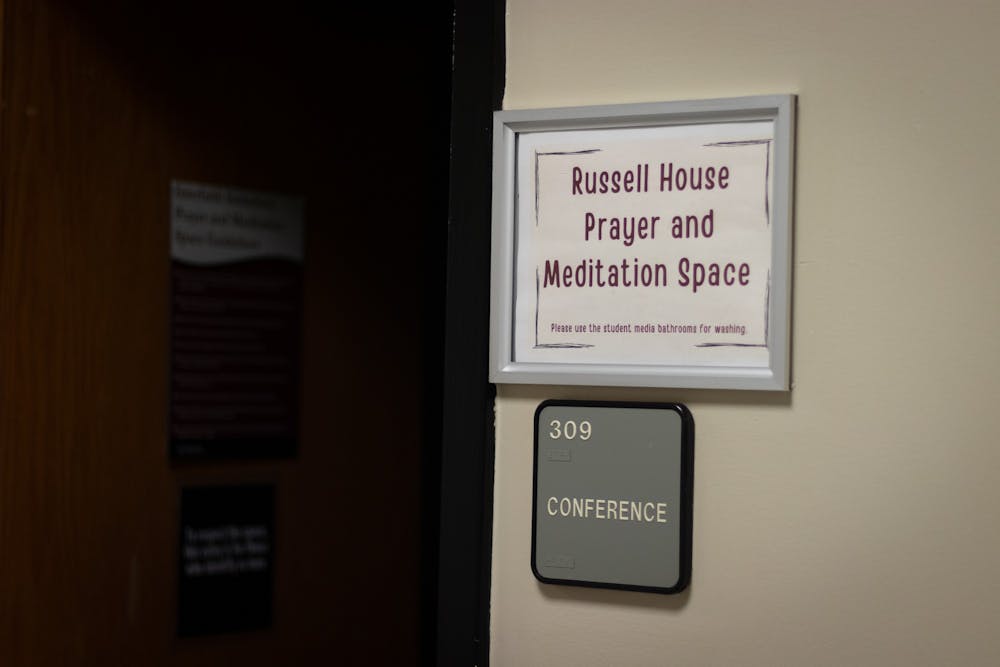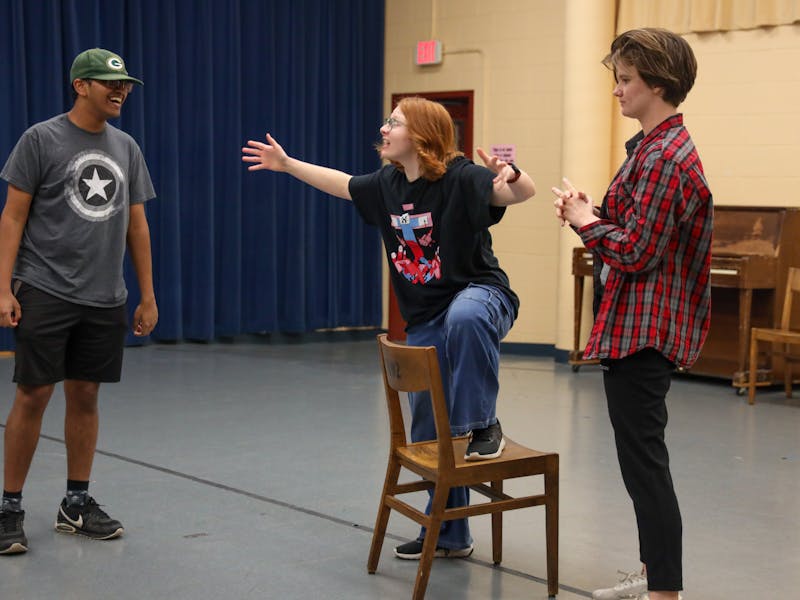Ever felt in need of a place to decompress and be with yourself? A place to unwind from sensory overload? A place to nurse a child? If the answer to any of these questions is “Yes,” Russell House is your new destination.
Russell House has developed spaces on the third floor such as a prayer and meditation room, a lactation room and an ablution room to provide students with the access and comfort of these places as needed.
These areas of Russell House were developed in partnership with Kim McMahon, director of the Russell House university union and Shay Malone, director of multicultural student affairs. These inclusive spaces were created from the demand for everyone to feel included within the union and university, Malone said.
“We see the need, and we know there's an interest to have some of these spaces in the center of where students live. Like, the union is kind of your home,” Malone said. “So, with it being your home, we think that there should be spaces within the union for everyone to feel like this is their space.”
In January, during a retreat with her colleagues from the Department of Student Life, McMahon said they did exercises about serving students and how to pull in students that are underserved.
“It was in that meeting that I wrote down prayer meditation space, lactation room, ablution sink,” McMahon said. “Having those spaces says to students, 'We value what your unique needs are. And you are welcome here and your mere presence allows us to be better.'”
The lactation space is located in room 312 on the third floor of Russell House. Earlier in the year, a student asked if there was a place where she could pump and she ultimately had to use a back office. Seeing the need for a specific, private room, the department used the student's experience and feedback from nursing mothers who work in the Russell House to create the space.
“You go through events in the Russell House, you have programs in the Russell House, you have meetings in the Russell House, and you can't go anywhere to nurse; so that's why that room is there,” Malone said.
McMahon explained the lactation space can also be used as a sensory power down space.
“If we have a student in crisis that needs to just take a minute, because we do have students that sometimes, it just gets too much, and then you add the lights and the noise and the sound that sometimes can happen at Russell House,” McMahon said. “We can use that as that backup space.”
The ablution sink is located in room 313 on the third floor of Russell House. Ablution is the washing of one's body or part of it as in a religious rite, according to Merriam-Webster.
“For some spiritual or religious observances, you have to wash your hands,” Malone said. “So washing hands, feet, face, before you pray or after you pray. We're just having the ablution sink to make sure [those who practice] are able to do that.”
Ablution, in religion, is a prescribed washing of part or all of the body or of possessions, such as clothing or ceremonial objects, with the intent of purification or dedication, according to Brittanica. Ablution is common in most ancient religions. Shintoists, Buddhists and Hindus all recognize ablution as part of their ritual practice. Ablution is important in varying forms in Catholicism, Islam and Judaism.
The prayer and meditation space is located in room 309 on the third floor of Russell House. The space is open to all faiths and religions to pray, meditate and reflect.
McMahon and Malone had help from students such as the Muslim Student Association on campus to help understand students' needs about prayer and meditation.
“The goal is that all the prayer meditation rooms on campus are similar, so that you can be in any of the spaces and engage in your practices without any concern for your own safety or for your own faith and values,” McMahon said. "We worked with students to make this space as neutral as possible.”
Farehaa “Fay” Hussain, president of the Muslim Student Association, has used both the ablution sink and prayer and meditation room.
“When I have that prayer space, it’s kind of like, ‘This is a dedicated space, this is meant for this, it was meant for me to be myself, for me to engage in my prayers to gain, you know, what makes up part of my identity.’ So there's so much more peace," Hussain said.
Praying is one of the five pillars of Islam, Hussain said. Prayer is performed in a prescribed manner five times each day, according to Brittanica.
"The first one comes at 12:00, and the last one is at like 6:30. So, that kind of shows you how frequently that we do it," Hussain said. "I've noticed that if I let my prayers go, like basically everything else goes too. My grades go, my mental health goes, my fashion goes, everything goes,” she said. “And by having a space for that lets USC first send a message out that you are accepted, you are welcome.”
Hussain said the prayer and meditation room is especially helpful for those who live off campus and want a private place to pray.
"It is functionally so good. Because you know, it eliminates the thought in your head about where am I going to pray, is it going to be safe," she said.
Hussain views inclusive rooms inside of the Russell House such as the prayer meditation room as a safe space.
"There's a lot more common peace, like I am where I belong to pray," Hussain said. "And it's nice to see other people using it. It's just nice to, you know, say, 'Salaam,' which is what you would say to another Muslim when you're greeting them."
McMahon said she hopes that students know that they are the department's best recruiters for more students to use these spaces. She and the Russell House Union department are open to feedback and ideas of what students want to see inside of Russell House.
“My hope is that students leave a bit more whole,” McMahon said.



